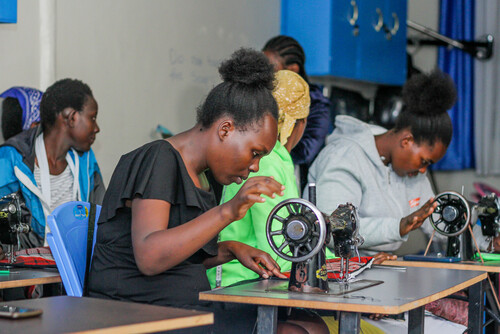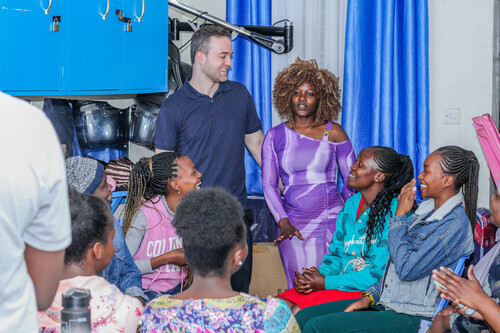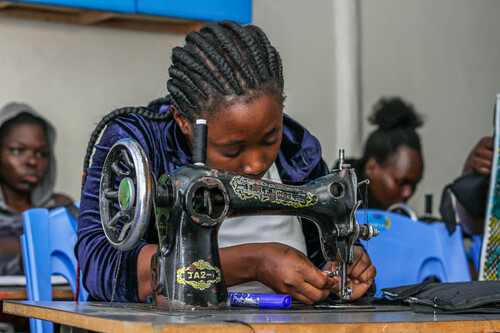Albertans Paying It Forward: Nafasi Opportunity Society

Image: Nafasi Opportunity Society sewing program
This story is one of ACGC's five-part series on Albertans 'paying it forward' in their work to make the world a more just, fair, and sustainable place for all. This story centers around the work of Nafasi Opportunity Society, which is dedicated to empowering individuals and communities by providing access to education and skill development opportunities through local training programs in Africa.
NOTE: quotes and details are taken from an interview with Dr. Jack Underschultz in July 2024, unless otherwise noted.
----
It’s safe to say that Jack Underschultz has always been a global citizen, which certainly comes in handy when running a non-profit looking to uplift communities on the other side of the world. Jack is the President of Nafasi Opportunity Society, whose mission is to empower individuals and communities by providing access to education and skill development opportunities.
“We’re all citizens of the world. The issues that are happening across the ocean are just as important as the issues in your own backyard,” says Jack. He is currently an Emergency Medicine resident, but this did not stop Jack from taking on the role of Nafasi’s President almost two years ago. Global development was my “number one passion out of high school,” says Jack, who went on to study business, but took a semester off in his final year to teach in Tanzania. Jack later switched to medicine and has continued to support international initiatives, such as leading Innovative Canadians for Change’s ceramic water filter project in Kenya and doing a medical placement in Uganda. With Nafasi, Jack has had the opportunity to further lead development projects in East Africa.

Image: Jack Underschultz and program participants
Founded in 2011, Nafasi is entirely volunteer-run by a team in Edmonton with partners in East Africa, with all of its funds going to program costs. The main program that Nafasi runs is the Mathare Women’s Empowerment Project in Kenya. In addition to the Mathare Project, Nafasi also supported a hairstyling program in Tanzania, which ran until 2020.
The Mathare Project, as the name suggests, is based in Mathare, a slum in Nairobi. The region lacks essential services and infrastructure, is overcrowded, and has a high crime rate, all of which disproportionately affect women. According to Jack, “there is upwards of a 77% dropout rate for girls in Kenya before the end of secondary school, with the primary drivers being poverty, food insecurity, and lack of access to necessities such as feminine hygiene products.” As a result, this can lead to girls being “sextorted” or entering child and teen marriages for financial security. Lack of education, combined with physical and sexual violence and unsafe living conditions, means that many women can be stuck in the cycle of poverty. But despite all of this, the women in Mathare are incredibly resilient. Nafasi sought to build on that resilience by working with their local partner, Build and Enlighten Communities Initiative (BECI), who provides skills and vocational training. This, in turn, empowers and provides an income-generating opportunity for the Mathare women.
Nafasi has also made it a priority to reduce the barriers to accessing training, such as by providing free meals and childcare at each session. Once women have completed their training, they are given access to equipment to create their products or offer their services, as well as a business start-up kit. “The number one thing that [the participants] said they were so grateful for was the opportunity to make their own money,” Jack recounts of his recent trip to visit the project. The women are also offered training on gender-based violence, reproductive rights, and legal rights by Nafasi’s local partners as well, with the intention of incorporating family planning and microfinancing classes in the future.
Jack firmly believes that empowering women is the key to paying it forward for future generations. “When you empower women, you’re usually empowering their children as well. In helping single mothers or young mothers, [you are supporting the creation] of stronger households that are safer for these children to grow up in. And when you empower women, they will become role models for younger women.”

Image: Nafasi sewing program
As with many small organizations, one of the greatest challenges Nafasi faces is getting long-term, sustainable funding. But even with this challenge, Nafasi has been incredibly successful in its programming, which Jack credits to the efforts of the local partners who are “the true stars and absolutely amazing people. I am constantly inspired to be the best ally I can be.”
As for how Canadians can show support? First and foremost, by recognizing that everyone is a citizen of the world and that helping just one person makes the whole world better. Canadians can also donate directly to the Mathare Project or volunteer with Nafasi.